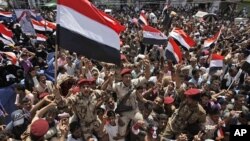Yemen's President Ali Abdullah Saleh is in Saudi Arabia for treatment of injuries sustained in a rocket attack Friday, raising further uncertainty in his country, where many are seeking his ouster.
Thousands of anti-government protesters took to the streets of Sana'a to celebrate President Saleh's departure. While many in the crowd decried the violence that culminated in the attack on Saleh's compound Friday, some, like this man, felt the country would be better with him gone.
Referring to the recent killing of protesters in the southern city of Taiz, the man, who did not give his name, called Saleh a murderer who has received his punishment.
|
A Timeline of Unrest in Yemen January 22: Hundreds of students and other protesters gather at Sana'a University, calling for an end to the 32-year rule of President Ali Abdullah Saleh. |
How long the president will be out of the country is uncertain. His injuries appear to be more serious than the "scratches" officials described in the immediate aftermath of the attack.
Deputy Information Minister Abdou al-Janadi said the president had assigned Vice President Abd al-Rab Mansur Hadi as acting president.
Janadi said the vice president was in continuous communication with Saleh, who he now described as having suffered burns. The official added that the president would be returning to Sana'a and resume his duties as soon as he is recovered.
But even if Saleh's physical condition improves, Saudi Arabia, which has led a regionally-mediated effort to have him leave power, could try to encourage him to not return home, as it is far from clear what his reception in Yemen would be.
The chairman of the Gulf Research Center, in Jeddah, Saudi Arabia, Abdulaziz Sager, believes that while the Yemeni president would never have wished for the attack that killed at least seven other people, it does provide him with a certain political cover.
"I think he could not have been luckier than that to have a face-saving device by leaving the country for a good medical cause, and not for another reason that would, in his own way of thinking, make him ashamed in front of his tribe and his people," he said.
In the interim, Sager thinks Vice President Hadi will be able to provide some short-term stability.
"We are starting to see the vice president in Yemen quickly acting in putting the scene together," said Sager. "Most likely, we are going to see a transition council, and this transition council will consist of military, tribal leaders and different opposition parties together and this is the most likely scenario we are going to see in Yemen in the next couple of days."
Beyond seeking Saleh's ouster, those leaders do not share much common ground. Rivalries split the country on political, military and tribal lines, with alliances frequently shifting.
Some officials blame the al-Ahmar clan of the Hashid tribal federation for the attack on the president's mosque, but the clan says it was not involved. Government officials say they are also investigating whether the local terror group, al-Qaida in the Arabian Peninsula was responsible.
Political protesters issued a statement after Saleh's departure calling for a civilian transitional leadership, without those involved in the violence.
While not civilian, several leading military officers who broke with the president in recent weeks have not engaged in any fighting. They have given their moral support to the anti-Saleh movement and have control over an unknown number of troops.
There are reports other troops were abandoning their positions in Taiz, and that gunmen attacked a presidential palace in the city. Security forces are also said to be withdrawing from their posts in the southern port city of Aden.
Security in Yemen is already tenuous, with areas beyond the capital largely in the hands of a variety of forces, including southern secessionists, northern rebels, a strong Islamist movement, and al-Qaida in the Arabian Peninsula.
Add to that an influx of Somali refugees from across the Gulf of Aden and some observers are wondering if Yemen faces the same lawless, chaotic fate as Somalia. It is a scenario Yemen's neighbors, as well as the United States are trying to prevent.
The Gulf Research Center's Sager says any interim council must work quickly.
"Today we have a vacuum in the constitutional issues because, you know the president released the government," said Sager. "So there is no more government in place. The parliament duration is ended, so we are going to need to have elections for the parliament also, we are going to need a transition and interim government now to run the issues for a month or two until everything is put in place. I think the amount of effort required now is far, far, far, far more than what is expected during the time of Ali Saleh if he had made a smooth transition."
Analyst Sager notes that whoever runs the Arab world's poorest country must tackle all these problems with a near-empty government vault.




